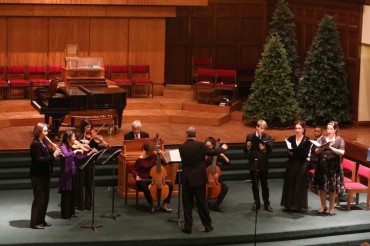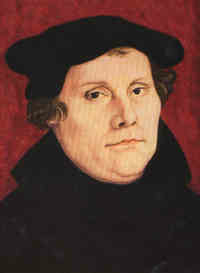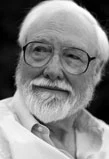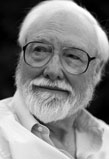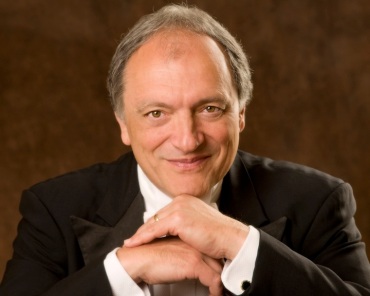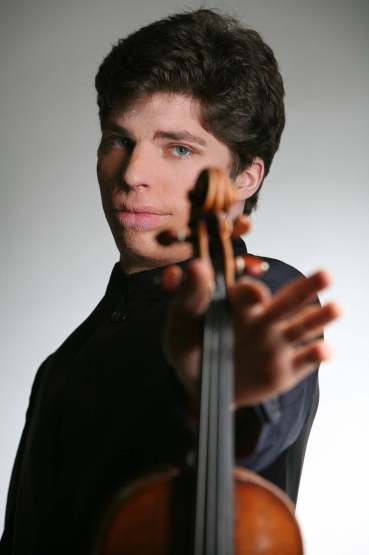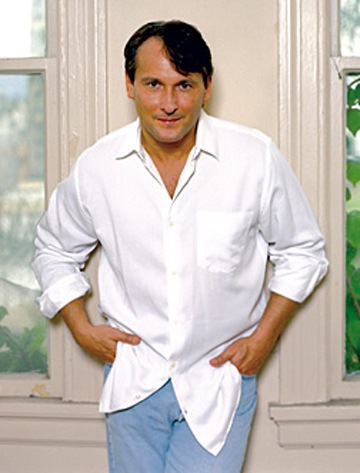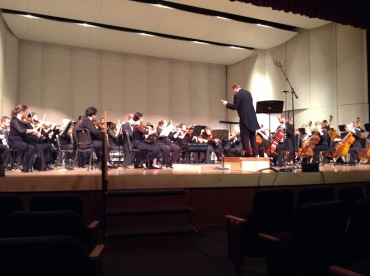The Well-Tempered Ear
Classical music: This Wednesday brings a FREE Just Bach concert and the FREE Final Forte concerto competition of the Madison Symphony Orchestra on Wisconsin Public Radio and Wisconsin Public Television
2 Comments
IF YOU LIKE A CERTAIN BLOG POST, PLEASE SPREAD THE WORD. FORWARD A LINK TO IT OR, SHARE or TAG IT (not just “Like” it) ON FACEBOOK. Performers can use the extra exposure to draw potential audience members to an event.
By Jacob Stockinger
This Wednesday, March 13, brings two noteworthy and FREE events: this month’s midday Just Bach concert; and, at night, the annual Final Forte teenage concerto competition of the Madison Symphony Orchestra.
Here are details about both events:
JUST BACH
This month’s FREE hour-long performance by Just Bach (below, in a photo by John W. Barker) will take place at Luther Memorial Church, 1021 University Avenue, starting at 1 p.m. Food and drink are permitted and free-will donations are accepted.
The program this Wednesday is: the Toccata and Fugue in D Minor “Dorian” for organ, BWV 538, by Johann Sebastian Bach; the cantata “Herr, Ich Warte auf dein Heil” (Lord, I Wait for Your Salvation) by Johann Michael Bach, a cousin of Johann Sebastian; and the famous cantata “Christ lag in Todesbanden” (Christ Lay in the Bonds of Death”), BWV 4, by Johann Sebastian Bach. (You can hear the opening Sinfonia and Chorus to the latter in the YouTube video at the bottom.)
Here is a list of upcoming performances and programs for the second semester:
https://justbach.org/concerts/
And here is a link to the home page and website with links to information about the performers and more.
FINAL FORTE
Then on Wednesday night, starting at 6:45 p.m. in Overture Hall of the Overture Center, the four finalists in the annual Final Forte teenage concerto competition, held by the Madison Symphony Orchestra, will compete accompanied by the MSO and conductor John DeMain.
The public is invited to attend the FREE event, but tickets but must be reserved in advance.
The performances will also be broadcast live starting at 7 p.m. by both Wisconsin Public Television (WPT) and Wisconsin Public Radio (WPR).
The four finalists, from dozens of statewide applicants who took part in the two preliminary rounds, are (below, from left): violinist Monona Suzuki of Fitchburg playing Ravel; cellist Grace Kim of Waunakee playing Saint-Saens; flutist Holly Venkitaswaren of Lisbon playing Pierce; and pianist Antonio Wu of Madison playing Rachmaninoff.
For more information about the performers, what they will perform and how to obtain tickets, as well as background on the competition, including impressive radio and television ratings, go to:
Tags: #BachCantata, #BaroqueMusic, #BlogPost, #CamilleSaint-Saens, #CelloConcerto, #ChoralMusic, #ChristianChurch, #ChristianReligion, #FacebookPost, #FacebookPosting, #FinalForte, #FitchburgWisconsin, #FluteConcerto, #FoodandDrink, #HomePage, #HomeWebsite, #JesusChrist, #JohannMichaelBach, #JohannSebastianBach, #JohnDeMain, #JustBach, #LisbonWisconsin, #LutherMemorialChurch, #MadisonSymphonyOrchestra, #MadisonWisconsin, #MartinLuther, #MauriceRavel, #OrganMusic, #OvertureCenter, #OvertureHall, #PianoConcerto, #SergeiRachmaninoff, #SergeiRachmaninov, #ViolinConcerto, #VocalMusic, #WisconsinPublicRadio, #WisconsinPublicTelevision, #YouTubevideo, annual, Arts, audience, Bach, Bach cantata, Baroque, Baroque music, blog, Broadcast, Camille Saint-Saëns, Cantata, Cello, Chamber music, choral music, chorus, Christ, Christian, church, Classical music, compete, composer, concerto, conductor, cousin, death, donation, Dorian, drink, Early music, Facebook, Final Forte, finalist, finalists, Fitchburg, flute, flutist, food, forward, free, fugue, home page, impresisve, impressive, information, Jacob Stockinger, Jesus, Johann Michael Bach, Johann Sebastian Bach, John DeMain, Just Bach, Kim, like, link, Lisbon, live, Lord, Luther, Luther Memorial Church, Madison, Madison Symphony Orchestra, march, Martin Luther, Maurice Ravel, Midday, Music, noteworthy, Orchestra, organ, Overture Center, Overture Center for the Arts, Overture Hall, performer, Pianist, Piano, piece, post, posting, program, Radio, rating, Ravel, Religion, reservation, sinfonia, Suzuki, symphony, tag, teenage, teenager, Television, ticket, toccata, United States, University of Wisconsin-Madison School of Music, University of Wisconsin–Madison, Violin, violinist, vocal music, Website, Wednesday, Wisconsin, wisconsin public radio, Wisconsin Public Television, WPR, WPT, Wu, YouTube
Classical music: The UW-Madison Choral Union and UW Symphony Orchestra perform the Duruflé Requiem and Kodaly “Te Deum” this coming Saturday and Sunday nights
3 Comments
IF YOU LIKE A CERTAIN BLOG POST, PLEASE SPREAD THE WORD. FORWARD A LINK TO IT OR, SHARE or TAG IT (not just “Like” it) ON FACEBOOK. Performers can use the extra exposure to draw potential audience members to an event.
By Jacob Stockinger
In Mills Hall this coming Saturday night, Dec. 8, at 8 p.m. and Sunday night, Dec. 9, at 7:30 p.m., the University of Wisconsin-Madison Choral Union (below, in a photo by John W. Barker) and the UW Symphony Orchestra will perform two works: the Requiem by Maurice Duruflé; and the “Te Deum” by Zoltan Kodaly.
The Choral Union is a campus and community choral group that performs once each semester. This spring, it will take part in three performances of the Symphony No. 8, “The Symphony of a Thousand,” by Gustav Mahler with the Madison Symphony Orchestra, where conductor Beverly Taylor is the choral director.
In addition to the chorus and the orchestra there are student soloists.
In the Duruflé Requiem, the student soloists are: Michael Johnson, baritone; and Chloe Flesch, mezzo-soprano (below).
In the Kodaly “Te Deum,” the student soloists are: Jing Liu, soprano; Chloe Flesch, mezzo-soprano; Benjamin Hopkins, tenor; and bass Ben Galvin.
Tickets cost $17 for the public, $8 for students.
For more information about the works as well as a YouTube video preview of the Kodaly and information about how to obtain tickets in advance or at the door, go to: https://www.music.wisc.edu/event/choral-union-the-durufle-requiem/
Beverly Taylor (below), the longtime director of Choral Activities at the University of Wisconsin-Madison Mead Witter School of Music who will lead the performances, recently spoke to The Ear about the concert:
“I plan to retire in May 2020, so I’m picking some great music for my last few Choral Union concerts!
“I’ve always wanted to do the Duruflé Requiem, which Bruce Gladstone performed in Luther Memorial Church a few years ago in the organ version. But I knew we couldn’t get a good organ on stage in Mills Hall and still have room for the orchestra.
“I hadn’t realized that Duruflé (below) had written a full orchestra version without the organ, which is replaced by the woodwinds. So it seemed a wonderful piece to do. (You can hear the Kyrie movement from the Durufle Requiem in the YouTube video at the bottom.)
“Since I have the symphony orchestra only one semester, I ignore holiday music when it comes to programming for the Choral Union, and try to assemble a wonderful evening.
“The Duruflé piece sounds like music by Gabriel Fauré and other late French church works, with its less dramatic text choices and its warmth, lush color and tide-like swells and diminuendos.
“I’ve done the “Te Deum” by Kolday (below) twice before over my 24 years here. It continues to be a favorite, and I use it because I like it, because it’s about 20 minutes long and a good companion piece, and because it shows off the Choral Union so beautifully.
“It’s a work of great contrasts, from a thrilling opening to a quiet middle based on a Hungarian folksong, to a next-to-final fugato and to a very quiet ending.
“The only problem with this program? Both pieces end quietly! Can we still get a burst of applause?”
Tags: #BeverlyTaylor, #BlogInterview, #BlogPost, #BlogPosting, #BruceGladstone, #ChloeFlesch, #ChoralMusic, #ChoralUnion, #ChristianChurch, #ChristianReligion, #ContrapuntalMusic, #FacebookPost, #FacebookPosting, #FolkMusic, #Frenchcomposer, #FrenchMusic, #GabrielFaure, #GustavMahler, #HolidayMusic, #HungarianComposer, #JohnW.Barker, #LutherMemorialChurch, #MadisonSymphonyChorus, #MadisonSymphonyOrchestra, #MartinLuther, #MauriceDuruflé, #MeadWitterSchoolofMusic, #Mezzo-sopranoSinger, #OrchestralMusic, #OrganMusic, #RomanCatholicism, #SopranoSinger, #SymphonyofaThousand, #SymphonyOrchestra, #TeDeum, #TenorSinger, #UniversityofWisconsin-Madison, #UWChoralUnion, #UWSymphonyOrchestra, #VocalMusic, #WoodwindSection, #YouTubevideo, #ZoltanKodaly, applause, Arts, baritone, bass, Beverly Taylor, blog, Bruce Gladstone, Campus, Cello, Chloe Flesch, choral music, Choral Union, Christian, Christian religion, church, Classical music, color, community, companion, composer, conductor, contrapuntal, counterpoint, director, Durufle, Facebook, Faure, Folk music, folksong, France, French music, fugato, Gabriel Fauré, Gustav Mahler, Holiday, holiday music, Hungary, information, interview, Jacob Stockinger, Kyrie, Luther Memorial Church, Lutheranism, Madison, Madison Symphony Chorus, Madison Symphony Orchestra, Martin Luther, Maurice Durufle, Mead Witter School of Music, Mezzo-soprano, movement, Music, Orchestra, organ, performance, post, posting, quiet, Requiem, retire, Retirement, Roman Catholicism, semester, soloist, soprano, Student, swells, symphony, Symphony of a Thousand, symphony orchestra, Te Deum, tenor, text, thrilling, ticket, United States, University of Wisconsin-Madison School of Music, University of Wisconsin–Madison, UW Choral Union, UW Symphony Orchestra, vocal music, warmth, Wisconsin, wonderful, woodwinds, YouTube, Zoltan Kodaly
Classical music: The Madison Bach Musicians will give their eighth annual Baroque Holiday Concert this Saturday night
2 Comments
IF YOU LIKE A CERTAIN BLOG POST, PLEASE SPREAD THE WORD. FORWARD A LINK TO IT OR, SHARE or TAG IT (not just “Like” it) ON FACEBOOK. Performers can use the extra exposure to draw potential audience members to an event.
By Jacob Stockinger
The Madison Bach Musicians will give their eighth annual Baroque Holiday Concert (below in a 2014 photo by Kent Sweitzer) on this coming Saturday night, Dec. 8, at the First Congregational United Church of Christ, 1609 University Avenue, near Camp Randall Stadium.
The critically acclaimed and well attended annual concert will follow the usual format with a 7:15 p.m. lecture by founder, artistic director and keyboardist Trevor Stephenson (below) followed by the concert at 8 p.m.
A critically acclaimed chamber ensemble of voices and period instruments will perform masterworks from the 16th, 17th and 18th centuries.
Performers include: Hannah De Priest, soprano; Margaret Fox, mezzo-soprano; Ryan Townsend Strand, tenor; Matthew Chastain, bass-baritone; Arash Noori, theorbo; Katherine Shuldiner, viola da gamba; and Trevor Stephenson, harpsichord.
The Ear asked Stephenson: Why are vocal music and Baroque music both so popular during the holiday season?
He answered: “Many holiday traditions focus on soulfulness and reflection. So, as my great-grandmother used to say, “Pay attention to the singing, it is closest to the soul.””
“On top of this, Baroque music—as one of the great achievements of Western culture—is a natural when reflecting upon the past,” Stephenson adds. “Baroque music is also festive and uplifting, and there is, I believe, some message within its intricacies and design that suggests that there is “a beautiful crystalline structure within which we all live.” (These words come from my colleague Norman Sheppard.)
“This concert marks the Madison Bach Musicians’ eighth consecutive year in the magnificent setting of the First Congregational Church. I simply cannot imagine a better acoustic and spiritual ambiance for this music. (Below is a performance from the 2016 concert in the same church.)
“The program will progress in chronological order from the very early 16th century up to the middle 18th century, from Josquin des Prez to Johann Sebastian Bach.
“We’ll start with the Kyrie and Gloria movements from one of Josquin’s last completed masterworks, the Missa Pange Lingua (c. 1515). Martin Luther’s praise for Josquin’s compositional genius was boundless: “Joaquin (below) is the master of the notes. The notes must do as he wills; as for other composers, they have to do as the notes will.”
“MBM is thrilled that virtuoso lutenist Arash Noori (below) from New York City will join us for this concert; second on the program, Noori will perform (on theorbo, which is a mega-lute) Niccolo Piccinni’s sparkling Toccata Chromatic and Gagliarda Prima published in the early 17th century.
“We’ll follow this with three musical gems for vocal quartet and continuo from the Kleine geistliche Konzerte (Short Spiritual Concerts, 1636−1639) that Heinrich Schütz (below) composed specifically for small ensembles, which were all that were available during the devastation of the Thirty Years’ War (1618−1648).
“The second half of the program is devoted to works by Bach. We’ll start with the exquisite Sonata in G major for Viola da Gamba and Harpsichord; gambist extraordinaire Kate Shuldiner (below) from Chicago will be featured and I’ll accompany her at the harpsichord.
“We’ll follow this with two Christmas songs from the Schemelli Songbook—a collection published in 1736 of more than 60 spiritual songs for which Bach wrote most of the harmonizations and contributed several great original tunes to boot.
“Soprano Hannah De Priest (below top) and mezzo-soprano Margaret Fox (below bottom) will be featured in the bouncy and charming duet, Wir eilen mit schwachen, doch emsigen Schritten (from Cantata 78, “We hasten, with weak, yet eager steps, O Jesus, O Master, to You, for help!”), which you can hear in the YouTube video at the bottom.) Bach not only worshipped God, but also felt comfortable enough in the relationship to occasionally party; this work is an ingenious fusion of high art and polka romp!
“The concert will conclude with Bach’s glorious motet, Lobet den Herrn, alle Heiden (Praise the Lord, All Ye Nations). It was Mozart who — when he journeyed to Leipzig in 1789, or 39 years after Bach’s death, and heard the Thomaskirche choir perform a Bach motet, from memory, no less — exclaimed, “Now here is something one can learn from!””
TICKET INFORMATION
Advance-sale discount tickets are $30 general admission.
Tickets are also available at Orange Tree Imports and the Willy Street Coop East and West.
You can also purchase advance tickets online: www.madisonbachmusicians.org
Tickets at the door are $33 for general admission, $30 for seniors 65 and over. Student Rush tickets are $10 and will be on sale 30 minutes before the 7:30 p.m. lecture.
For more information, go to: www.madisonbachmusicians.org
Tags: #ArashNoori, #ArtisticDirector, #BachCantata, #BaroqueMusic, #BlogPost, #BlogPosting, #CampRandallStadium, #ChamberMusic, #ChoralMusic, #ChristianChurch, #ChristianReligion, #ChristmasSong, #CriticallyAcclaimed, #FacebookPost, #FacebookPosting, #FirstCongregationalUnitedChurchofChrist, #Great-Grandmother, #HarpsichordContinuo, #HeinrichSchütz, #HighArt, #HolidayConcert, #HolidayMusic, #HolidaySeason, #JesusChrist, #JohannSebastianBach, #JosquindesPrez, #LeipzigGermany, #MadisonBachMusicians, #MartinLuther, #Mezzo-sopranoSinger, #NewYorkCity, #NiccoloPiccinni, #OrangeTreeImports, #PeriodInstruments, #SeniorCitizen, #SopranoSinger, #SpiritualMusic, #StudentRush, #TenorSinger, #TheLord, #ThirtyYearsWar, #ThomasKirche, #TrevorStephenson, #VioladaGamba, #VocalMusic, #WillySt.Coop, #WillyStreetCo-op, #WolfgangAmadeusMozart, #YouTubevideo, acclaimed, accompany, acoustics, adult, ambiance, Arash Noori, Artistic director, Arts, Bach, Baroque, Baroque music, bass-baritone, beautiful, blog, Camp Randall Stadium, Cantata, Chamber music, Chicago, choral music, Christian, Christian religion, Christmas, chromatic, church, Classical music, composer, Concert, continuo, critically, death, design, devastation, Early music, Facebook, festive, First Congregational United Church of Christ, forward, founder, fusion, gem, genius, Germany, Gloria, harmony, harpsichord, Heinrich Schütz, Holiday, Jacob Stockinger, Jesus Christ, Johann Sebastian Bach, Josquin Des Prez, Kyrie, learn, Leipzig, link, live, Lord, lute, Madison, Madison Bach Musicians, Martin Luther, mass, Master, masterwork, message, Mezzo-soprano, motet, Mozart, Music, New York City, notes, Orange Tree Imports, period-instrument, Piccinni, polka, praise, Quartet, reflection, Religion, romp, Season, senior, share, singbook, Singing, Sonata, soprano, soul, soulfulness, spiritual, structure, Student, tag, tenor, theorbo, Thirty Years War, Thomas Kirche, ticket, toccata, tradition, Trevor Stephenson, tune, United States, University of Wisconsin-Madison School of Music, University of Wisconsin–Madison, uplifting, viola da gamba, vocal music, war, Wisconsin, Wolfgang Amadeus Mozart, word, YouTube
Classical music: This week’s “Just Bach” concert on Wednesday afternoon features Halloween fare as well as instrumental and vocal music typical of Johann Sebastian
1 Comment
IF YOU LIKE A CERTAIN BLOG POST, PLEASE FORWARD A LINK TO IT OR SHARE IT (not just “Like” it) ON FACEBOOK. Performers can use the extra exposure to draw potential audience members to an event.
By Jacob Stockinger
BOO!!
But this time it’s all treat and no trick!
This month’s FREE concert in the new midday series of Just Bach (below, in a photo by John W. Barker) falls on Wednesday – that is, on Halloween!
In keeping with the spooky holiday, this week’s Just Bach concert will feature one of the traditional pieces of classical music used on Halloween: the mighty and well-known Toccata and Fugue in D minor for organ. (You can see an abstract and fascinating animated graphic depiction of the work in the YouTube video at the bottom.)
The FREE concert runs from 1 to 2 p.m. at Luther Memorial Church (below) at 1021 University Avenue. The audience is permitted to eat lunch and drink refreshments during the midday concert.
Two other works are on the program.
One is the Suite No. 5 in C minor for solo cello, played by James Waldo (below). A discerning friend of The Ear heard Waldo play a different solo cello suite at a concert last month by the Madison Bach Musicians, and said it was probably the finest interpretation he had ever heard. And he has heard a lot of them.
The last work will be the Cantata No. 163 “Nur Jedem das Seine,” or “To Each His Own,” with singers and instrumentalists performing on period instruments with historically informed performance practices.
For information about the series, go to: https://justbach.org
Specifically, if you want to know more about the dates and programs, go to:
https://justbach.org/concerts/
And if you want to know more about the performers, go to: https://justbach.org/about-us/
Finally, if you want to know more about the background and genesis of the new concert series, here is a link to a previous post:
https://welltempered.wordpress.com/?s=Just+Bach
Tags: #BachCantata, #BlogPost, #BlogPosting, #CelloMusic, #CelloSuite, #ChoralMusic, #ChristianChurch, #ChristianMusic, #ChristianReligion, #FacebookPost, #HalloweenMusic, #HistoricallyInformedPerformancePractices, #James Waldo, #JohannSebastianBach, #JohnW.Barker, #JustBach, #LutherMemorialChurch, #MadisonBachMusicians, #MartinLuther, #Mid-day, #MusicalInterpretation, #OrganMusic, #PeriodInstruments, #SuiteforSoloCello, #ToccataandFugueinDminor, #TrickorTreat, #VocalMusic, Bach cantata, background, Boo, Cello, choral music, Christian, Christianity, church, Concert, date, day, drink, eat, Facebook, Genesis, Halloween, historically informed performance practices, instrumentalist, interpretation, John W. Barker, Just Bach, lunch, Luther Memorial Church, Lutheranism, Madison Bach Musicians, Martin Luther, Midday, might, mighty, month, monthly, noon, noon time, organ, period instruments, program, refreshment, singer, spooky, time, Toccata and Fugue in D minor BWV 565, traditional, treat, trick, vocal music, Waldo, week, well-known
Classical music: The legendary St. Thomas Boys Choir of Leipzig will perform Reformation music at Luther Memorial Church this Sunday night
2 Comments
By Jacob Stockinger
In celebration of the 500th anniversary of the Reformation, Luther Memorial Church will host the historic and legendary St. Thomas Boys Choir (Thomanerchor) of Leipzig, Germany.
The famed boychoir will perform this coming Sunday night at 7 p.m. at Luther Memorial Church (below), 1021 University Ave.
The program will present music of Johann Sebastian Bach (the motets “Fürchte dich nicht,” “Komm, Jesu, komm” and “Der Geist hilft”) and unspecified choral music of Heinrich Schütz, Johann Schein and Felix Mendelssohn.
Tickets are available at www.luthermem.org/st-thomas at $20, $30 and $50. Student rush tickets will be available day of concert.
The St. Thomas Boys Choir (Thomanerchor) of Leipzig, Germany, was founded in 1212. Johann Sebastian Bach (below) served as Thomaskantor, director of the choir, from 1723 to 1750. (For more background about the group, its pedigree and the music of Bach, see the YouTube video at the bottom.)
Tags: anniversary, Arts, Bach, background, Baroque, boy, boychoir, boys, boys choir, celebrate, celebration, Choir, choral music, chorus, Christian, Christianity, church, Classical music, composer, director, divine, Early music, fame, famed, fear, German, Germany, group, Heinrich Schütz, historic, History, Holy Ghost, Holy Spirit, Jacob Stockinger, Jesu, Jesus, Johann Schein, Johann Sebastian Bach, legend, legendary, Leipzig, Luther, Luther Memorial Church, Martin Luther, Medieval, memorial, Mendelssohn, Middle Ages, motet, Music, pedigree, program, Protestant Reformation, Reformation, rush, Schuetz, St. Thomas Boys Choir, Student, Sunday, ticket, United States, university, University of Wisconsin-Madison School of Music, University of Wisconsin–Madison, vocal music, Wisconsin, YouTube
Classical music: Chicago Gargoyle Brass and Organ Ensemble to bring ‘Music of the Reformation’ to four Wisconsin cities, including Madison, Oct. 27–29
Leave a Comment
By Jacob Stockinger
The Chicago Gargoyle Brass and Organ Ensemble (below) will perform a late-October series of FREE public concerts in four Wisconsin cities featuring music by composers Johann Sebastian Bach, Felix Mendelssohn and others in a centuries-spanning program titled “Music of the Reformation.”
Performances will take place Friday, Oct. 27, in Appleton; Saturday, Oct. 28, in Delafield and Watertown; and Sunday, Oct. 29, in Madison.
“The hour-long concert program commemorates the 500th anniversary of the start of the Protestant Reformation in Germany in 1517,” said Rodney Holmes, founder and artistic director of the Gargoyle ensemble. “Audiences will hear works embracing the most famous melodies written by Reformation leader Martin Luther (below), who was a composer as well as a religious figure.”
The program includes James Curnow’s contemporary “Rejouissance: Fantasia on ‘Ein feste Burg’ (A Mighty Fortress)” for organ; Heinrich Schütz’s “Three Becker Psalms,” Op. 5, a Baroque work for brass quartet; Bach’s Canonic Variations on “Vom Himmel hoch da komm’ ich her” (“From Heaven above to Earth I come”), BWV 769, for organ; and Otto Nicolai’s early Romantic “Ecclesiastical Festival Overture on the chorale ‘Ein feste Burg ist unser Gott,’” Op. 31, arranged for brass and organ by Craig Garner.
Also on the program are: Max Reger’s late Romantic “Ein’ feste Burg ist unser Gott,” Op. 27, for organ; Randall E. Faust’s contemporary “Fantasy” on the hymn “Von Himmel hoch,” for horn and organ; and Garner’s brass and organ arrangement, “Introduction and Finale,” from Mendelssohn’s Symphony No. 5, “Reformation,” Op. 107.
Performers will include Madison-based organist Jared Stellmacher (below), an award-winning musician heard on the Chicago Gargoyle Brass and Organ Ensemble’s critically acclaimed 2015 debut CD “Flourishes, Tales and Symphonies.” He holds a master’s degree in music from Yale University.
Gargoyle brass players will include trumpeters Lev Garbar and Andrew Hunter, horn player Kathryn Swope, trombonist Karen Mari, and artistic director Holmes on tuba.
CONCERT SCHEDULE
Here are the dates, times, and locations of the Gargoyle ensemble’s “Music of the Reformation” concerts, with local contact information. No tickets or reservations are required for these FREE events:
*Friday, Oct. 27, at 7:30 p.m. at Zion Lutheran Church, 912 North Oneida Street, in Appleton, Wis., 54911. www.zionappleton.com/home
Contact: Matthew Walsh, 920-739-3104
*Saturday, Oct. 28, at 3 p.m. at Christ the King Lutheran Church, 1600 North Genesee Street, in Delafield, WI 53018
Contact: Mark Gould, 262-646-2343
*Saturday, Oct. 28, at 6:30 p.m. at Immanuel Evangelical Lutheran Church, 204 North Tenth Street, Watertown, WI 53094
Contact: Janis Shackley, 920-261-1663
*Sunday, Oct. 29, at 2 p.m. at Good Shepherd Lutheran Church, 5701 Raymond Road, Madison, WI 53711
Contact: Jared Stellmacher, 608-271-6633
Chicago Gargoyle Brass and Organ Ensemble
“The Chicago Gargoyle Brass and Organ Ensemble plays with warmth, elegance, and panache,” said U.S. music magazine Fanfare in a review of the ensemble’s debut CD. “[They] are perfect companions for the music lover in need of calming nourishment.”
The group takes its whimsical name from the stone figures atop gothic buildings at the University of Chicago, where the now-professional ensemble got its start in 1992 as a brass quintet of faculty and students. (You can hear a sample in the YouTube video at the bottom.)
Under its founder and artistic director Rodney Holmes, it has evolved over the decades into an independent organization of classically trained musicians that focuses on commissioning and performing groundbreaking new works and arrangements for brass and pipe organ. You can find more information at gargoylebrass.com.
Tags: A Mighty Fortress, A Mighty Fortress Is Our God, Appleton, Artistic director, Arts, award, Bach, Baroque, brass, Brass quintet, Canon, canonic, CD, Chamber music, Chicago, Chicago Gargoyle Brass and Organ Ensemble, choral music, Christ, Christian, Christianity, church, Classical music, Compact Disc, Concert, Delafield, Earth, ecclesiastical, Ein feste Burg, Fantasia, fortress, free, gargoyle, Germany, God, Gothic, heaven, Heinrich Schütz, Horn, hymn, Jacob Stockinger, James Curnow, Jared Stellmacher, Johann Sebastian Bach, King, Lutheran, Lutheranism, Martin Luther, Max Reger, melody, Mendelssohn, mighty, Music, Orchestra, organ, Otto Nicolai, program, Protestant, Protestant Reformation, psalm, public, Quartet, quintet, Randall E. Faust, Reformation, Religion, symphony, Trombone, Trumpet, United States, University of Chicago, University of Wisconsin-Madison School of Music, University of Wisconsin–Madison, variations, Watertown, write, Yale University
Classical music: This afternoon is your last chance to hear the season-opening concert of music by Bach, Mendelssohn and Berlioz by the Madison Symphony Orchestra. Read the positive reviews here
1 Comment
By Jacob Stockinger
This afternoon at 2:30 p.m. in Overture Hall is your last chance to hear the highly praised season-opening concert “Orchestral Brilliance” by the Madison Symphony Orchestra (below top, in a photo by Peter Rodgers).
It will be conducted by music director John DeMain with a solo performance by MSO principal violist Christopher Dozoryst (below bottom).
The program features the dramatic orchestral arrangement, used in the soundtrack to Walt Disney’s famous film “Fantasia,” by Leopold Stokowski of the Toccata and Fugue in D minor for organ by Johann Sebastian Bach; the Symphony No. 5 “Reformation” by Felix Mendelssohn; and “Harold in Italy” by Hector Berlioz. (You can hear the famous “Pilgrim March” movement of the Berlioz work in the YouTube video at the bottom.)
Here are the positive reviews that were filed after the opening night performance on Friday:
Here is the review by John W. Barker (below) for Isthmus:
https://isthmus.com/music/superlative-season-opener/
Here is the review by Greg Hettmansberger for his “What Greg Says” blog:
https://whatgregsays.wordpress.com/2017/09/16/demain-honors-two-traditions/
And here is the review done by UW-Madison graduate piano student Kyle Johnson (below) for The Capital Times, which blocks the content to non-subscribers unless you first answer a survey:
For more information about the program, the performers, the prelude discussion, the program notes and tickets, go to:
Tags: Arts, Bach, Baroque, blog, Cello, Classical music, critic, Disney, Fantasia, film, Film score, graduate, Greg Hettmansberger, Hector Berlioz, Isthmus, Jacob Stockinger, Johann Sebastian Bach, John DeMain, John W. Barker, Kyle Johnson, Leopold Stokowski, Madison, Madison Symphony Orchestra, march, Martin Luther, movie, Music, Music director, Orchestra, organ, Overture Center, Pianist, Piano, pilgrim, Protestant, Reformation, review, soundtrack, Student, subscriber, survey, symphony, The Capital Times, Toccata and Fugue in D minor, United States, University of Wisconsin-Madison School of Music, University of Wisconsin–Madison, Viola, Violin, What Greg Says, Wisconsin, YouTube
Classical music: This weekend the Madison Symphony Orchestra opens its new season with Mendelssohn’s “Reformation” Symphony and music by Bach. It also highlights principal violist in music by Berlioz
3 Comments
By Jacob Stockinger
This coming weekend, the Madison Symphony Orchestra (MSO, below in a photo by Peter Rodgers), with music director John DeMain conducting, opens its 92nd season with a celebration of the 500th anniversary of the Lutheran Reformation.
The season-opening concert also showcases the Madison Symphony Orchestra as an ensemble with no guest soloist. The MSO’s Principal Violist Chris Dozoryst (below) will solo in Hector Berlioz’s “Harold in Italy.”
Also featured is Leopold Stokowski’s famous orchestral arrangement of Johann Sebastian Bach’s Toccata and Fugue in D Minor, and the 500th anniversary of the Lutheran Reformation will be honored with Felix Mendelssohn’s “Reformation” Symphony.
The concerts in Overture Hall of the Overture Center, 201 State Street, are on Friday night, Sept. 15, at 7:30 p.m.; Saturday night, Sept. 16, at 8 p.m., and Sunday afternoon, Sept. 17, at 2:30 p.m.
Ticket information is below.
According to the MSO press release: “The concerts present the music of two composers who shared a deeply spiritual relationship with the Lutheran faith, and passion for music. It is said that Johann Sebastian Bach set faith to music, and Felix Mendelssohn clarified faith for all to hear.
MSO Music Director John DeMain (below, in a photo by Greg Anderson) chose to pair Bach and Mendelssohn specifically for this program.
“Both Bach (below top) and Mendelssohn (below bottom) were devout Lutherans, Mendelssohn having converted from Judaism when he was 12 years old,” DeMain says.
“I decided to open the season with Leopold Stokowski’s great transcription of Bach’s Toccata and Fugue in D Minor for organ, and then give the first performance by the MSO of Mendelssohn’s Symphony No. 5, subtitled the Reformation. Indeed, this symphony quotes extensively from one of the greatest Christian hymns of all time — “A Mighty Fortress Is Our God.””
Bach’s Toccata and Fugue in D minor is a transcription for orchestra by Leopold Stokowski (below) and became well-known after its inclusion in Disney’s film Fantasia. The piece was originally cut from the theatrical release of the film, but was later added back in a 1946 re-release and included Stokowski directing the orchestra at the beginning of the piece. (You can hear the original version for organ, with an unusual graphic display, in the YouTube video at the bottom.)
Hector Berlioz’s “Harold in Italy” is considered an autobiographical vignette recounting the composer’s Italian experience. The piece is filled with youthful vitality, tinged with an appealing Romantic sensibility that Berlioz (below) borrowed freely from literature, most specifically Lord Byron’s poem “Childe Harold’s Pilgrimage.” Playing the solo viola part is MSO’s Principal Violist Chris Dozoryst.
The 2017–18 season will mark Christopher Dozoryst’s 10th season as principal viola with the Madison Symphony Orchestra. In addition to his orchestral duties, Chris also performs with the MSO’s HeartStrings Program as violist with the Rhapsodie Quartet. He also performs and records, working locally and regionally in Madison and Chicago. He has performed numerous engagements with well-known musicians including Tony Bennett, Ray Charles, and Smokey Robinson.
Originally commissioned in 1830 for a celebration of the 300th anniversary of the Augsburg Confession, Mendelssohn honors Martin Luther (below) in his Symphony No. 5 “Reformation” by including in the finale the beloved hymn Ein’ feste Burg is unser Gott (A Mighty Fortress Is Our God) that Luther had written while the Augsburg Confession was in session. This year marks the 500th anniversary of Luther’s Ninety-Five Theses and the establishment of the Lutheran Church.
One hour before each performance, Amy Hartsough (below), acting director of music at Bethel Lutheran Church, will lead a FREE 30-minute Prelude Discussion in Overture Hall to enhance concertgoers’ understanding and listening experience.
For more background on the music, please read the Program Notes by MSO trombonist and UW-Whitewater professor Michael Allsen at: http://www.allsenmusic.com/NOTES/1718/1.Sep17.html.
The MSO recommends that concert attendees arrive early for each performance to make sure they have time to pass through Overture Center’s security stations, and so they can experience the pre-concert talk (free for all ticket-holders).
Single Tickets are $18-$90 each and are on sale now at https://www.madisonsymphony.org/singletickets, through the Overture Center Box Office at 201 State Street, or by calling the Box Office at (608) 258-4141.
Groups of 15 or more can save 25% by calling the MSO office at (608) 257-3734. For more information, go to: https://www.madisonsymphony.org/groups.
Student rush tickets can be purchased in person on the day of the concert at the Overture Center Box Office at 201 State Street. Students must show a valid student ID and can receive up to two $12 or $18 tickets.
More information is at: https://www.madisonsymphony.org/studentrush
Seniors age 62 and up receive 20% savings on advance and day-of-concert ticket purchases in select areas of the hall.
Discounted seats are subject to availability, and discounts may not be combined.
Major funding for the September concerts is provided by: the Wisconsin State Journal and Madison.com, Rosemarie and Fred Blancke, Capitol Lakes, The Gialamas Company, Inc., Marvin J. Levy, Nancy Mohs, and Peggy and Tom Pyle. Additional funding is provided by: DeWitt Ross & Stevens S.C., Forte Research Systems and Nimblify, the Wisconsin Arts Board with funds from the State of Wisconsin, and the federal National Endowment for the Arts.
Tags: A Mighty Fortress Is Our God, anniversary, Arts, Augsburg Confession, autobiographical, autobiography, Bach, Baroque, Berlioz, Cello, Chicago, Childe Harold's Pilgrimage, Christian, church, Classical music, Concert, conductor, devout, discount, display, ensemble, faith, Fantasia, federal, film, finale, fugue, graphic, group, Harold in Italy, honor, hymn, ID, individual, Italian, Italy, Jacob Stockinger, Johann Sebastian Bach, John DeMain, Leopold Stokowski, literature, Lord Byron, Lutheran, Madison, Madison Symphony Orchestra, Martin Luther, movie, Music, Music director, Musician, National Endowment for the Arts, NEA, notes, Orchestra, organ, original, Overture Center, Passion, perform, poem, poet, Poetry, pre-concert, program, Protestant, Protestant Reformation, Ray Charles, record, Reformation, Rhapsodie Quartet, Romantic, Season, security, senior, Smokey Robinson, solo, soloist, spiritual, state, State of Wisconsin, String quartet, Student, talk, theater, theatre, theatrical, ticket, toccata, Toccata and Fugue in D minor, Toccata and Fugue in D minor BWV 565, Tony Benett, transcription, Trombone, United States, University of Wisconsin-Madison School of Music, University of Wisconsin–Madison, UW-Whitewater, video, vignette, Viola, Violin, Walt Disney, weekend, Wisconsin, Wisconsin Arts Board, Wisconsin State Journal, YouTube
Classical music: Madison Symphony Orchestra’s music director John DeMain discusses the 2017-18 season with critic John W. Barker
6 Comments
By Jacob Stockinger
Here is a special posting, an interview with the Madison Symphony Orchestra‘s music director John DeMain about the next season, conducted and written by frequent guest critic and writer for this blog John W. Barker.
Barker (below) is an emeritus professor of Medieval history at the University of Wisconsin-Madison. He also is a well-known classical music critic who writes for Isthmus and the American Record Guide, and who hosts an early music show once a month on Sunday morning on WORT FM 89.9 FM. For years, he served on the Board of Advisors for the Madison Early Music Festival and frequently gives pre-concert lectures in Madison.
By John W. Barker
Last month, I had a welcome opportunity to sit down with John DeMain (below, in a photo by Prasad), music director of the Madison Symphony Orchestra, together with his marketing director, Peter Rodgers, to discuss the orchestra’s recently announced 2017-18 concert season. (NOTE: Today is the deadline for current subscribers to renew and keep their seats. You can call 608 257-3734 or go to https://www.madisonsymphony.org/reneworder)
This meeting allowed me new insights into the various factors that go into selecting a season’s repertoire. It also gave me further appreciation of Maestro DeMain’s personality and talents.
It further revealed the unfairness of some criticism made that the coming season is “conservative” and repetitive of familiar works. In fact, his programming involves very thoughtful awareness of the differing expectations of the varied audience.
It has become customary to make the season’s opening concert a showcase for talented members of the orchestra, rather than for guest soloists.
The September program thus offers a masterpiece I particularly relish, Hector Berlioz’s Harold in Italy, a symphony with viola obbligato — featuring the orchestra’s principal violist, Chris Dozoryst (below).
But the inclusion of the neglected Fifth or “Reformation” Symphony by Felix Mendelssohn was decided as a link to this year’s 500th-anniversary commemoration of Martin Luther’s launching of the Lutheran Reformation in 1517. Also on the program is Leopold Stokowski’s orchestral arrangement of the Toccata and Fugue in D Minor for organ by Johann Sebastian Bach.
The October program contains a notable example of a familiar and popular “warhorse,” Antonin Dvorak’s Symphony No. 9, “From the New World.” This was indeed performed by the MSO two seasons back as part of the “Beyond the Score” presentations. DeMain indicates that the close repetition is made deliberately to connect with that past event, to expand further the audiences’ understanding of the work.
He is also juxtaposing the symphony with the appearance of the acclaimed Olga Kern (below), playing the Piano Concerto by Samuel Barber and with the “Mother Goose” Suite by Maurice Ravel.
The November soloist is guitarist Sharon Isbin, in two concertos, one new (“Affinity” by Chris Brubeck) and one old (Concierto de Aranjuez by Joaquin Rodrigo) She plays with her instrument electronically amplified, something very off-putting in my experience. But DeMain notes that all guitarists do that now in concert work, and he wanted to include the guitar to bring in new and different audience members.
Inclusion of suites by Aaron Copland and Manuel de Falla – “Billy the Kid” and “The Three-Cornered Hat,” respectively — also represent popular appeal.
January will bring a triumph for DeMain: the appearance of violinist Gil Shaham (below), after 15 years of efforts to secure him. Shaham will perform the Violin Concerto by Peter Tchaikovsky.
The all-Russian program also allows DeMain to venture for the first time into “The Love for Three Oranges” suite by Sergei Prokofiev and the Third Symphony of Sergei Rachmaninoff.
The issue of “warhorse” repetition is raised by the First Symphony by Johannes Brahms in the February program. But DeMain points out that it has been 10 years since the MSO played the work, a significant one that richly deserves performance by now.
He is also proud to include with it the outstanding Rossini opera overture (Semiramide) and the rarely heard Cello Concerto, with German cellist Alban Gerhardt (below), by the 20th-century British composer William Walton.
DeMain admits to mixed feelings about the “Beyond the Score” presentations of music and background context, but he is confident that the one offered (one night, outside subscriptions) on March 18, about the monumental Enigma Variations, by Sir Edward Elgar, (below) will work well.
The combination in April of Benjamin Britten’s powerful Sinfonia da Requiem and Robert Schumann’s First Symphony (“Spring”) with Antonin Dvorak’s sadly neglected Violin Concerto has special meanings for the maestro. It allows the return of the greatly admired Augustin Hadelich (below) as soloist.
But it also allows DeMain’s return, for his first time since 1974, to the Schumann score, with which he had a crucial encounter in a youthful appearance with the Pittsburgh Symphony.
Finally, the May program is an unusually exciting combination of Mozart’s too-little-appreciated Piano Concerto No. 22 with soloist Christopher O’Riley (below) of NPR’s “From the Top” with the roof-raising Glagolitic Mass, featuring the Madison Symphony Chorus, of Leos Janacek.
DeMain has made important commitments to the orchestral music of Janacek (below) before this, and his advance to the composer’s great blockbuster choral work is a landmark.
Amid savoring DeMain’s thoughts on the season – which also includes the MSO’s traditional Christmas concert in early December — and his wonderful recollections of past experiences, I came to recognize more than ever the remarkable combination of talents he brings to his Madison podium.
Beyond so many conductors, DeMain has had deeply engaging phases of his career in orchestral literature (large and small), in opera and musical theater, and in chamber music, while being himself an accomplished pianist.
With the breadth of his range, he brings a particular sensitivity to the contexts and diversities of what he conducts. He has become to his musicians not only a skilled guide, but also a subtle teacher, deepening their understanding without any hint of pedantry.
It cannot be said enough how truly blessed we are to have him with us in Madison.
For more information about the 2017-18 season, including specific dates and times, and about purchasing tickets for new subscribers and renewing subscribers, go to:
http://www.madisonsymphony.org/17-18
Tags: Aaron Copland, Alban Gerhardt, American Record Guide, amplification, arrangement, Arts, Augustin Hadelich, Bach, Baroque, Benjamin Britten, Berlioz, Beyond the Score, Billy the Kid, blockbuster, Brahms, Cello, Chamber music, choral music, Chris Brubeck, Christmas, Christopher O'Riley, Classical music, composer, concerto, Concierto de Aranjuez, critic, Dvorak, Early music, Elgar, Enigma Variations, From the New World, From The Top, Gil Shaham, Glagolitic, guitar, Harold in Italy, History, Isthmus, Italy, Jacob Stockinger, Janacek, Joaquin Rodrigo, Johann Sebastian Bach, Johannes Brahms, John DeMain, John W. Barker, landmark, lecture, Love of Three Oranges, Luther, Madison, Madison Early Music Festival, Madison Symphony Chorus, Madison Symphony Orchestra, Maestro, Manuel de Falla, marketing, Martin Luther, mass, Medieval, MEMF, Mendelssohn, Mother Goose, Mozart, Music, Music director, New World, NPR, Olga Kern, on-line, online, opera, Orchestra, orchestral, organ, Overture, Overture Center, personality, Pianist, Piano, Piano concerto, Pittsburgh Symphony Orchestra, professor, Prokofiev, Rachmaninpff, Ravel, Reformation, renew, repertoire, Requiem, Robert Schumann, Rossini, Russian, Samuel Barber, score, Semiramide, Sergei Prokofiev, Sergei Rachmaninoff, Sharon Isbin, soloist, Spring, Stokowski, subscriber, Suite, symphony, talent, Tchaikovsky, Three-Cornered Hat, Toccata and Fugue in D minor, traits, United States, University of Wisconsin-Madison School of Music, University of Wisconsin–Madison, Viola, Violin, Violin concerto, vocal music, Walton, warhorse, Wisconsin, Wolfgang Amadeus Mozart, WORT-FM 89.9, YouTube
Classical music: Middleton Community Orchestra and cellist Andrew Briggs succeeded beautifully in music by Rossini, Dvorak and Mendelssohn but a public reading of short essays by Matt Geiger seemed out of place
6 Comments
By Jacob Stockinger
Here is a special posting, a review written by frequent guest critic and writer for this blog, John W. Barker. Barker (below) is an emeritus professor of Medieval history at the University of Wisconsin-Madison. He also is a well-known classical music critic who writes for Isthmus and the American Record Guide, and who hosts an early music show once a month on Sunday morning on WORT FM 89.9 FM. For years, he served on the Board of Advisors for the Madison Early Music Festival and frequently gives pre-concert lectures in Madison. He also took the performance photos for this review.
By John W. Barker
Despite nasty weather and icy conditions, a quite substantial audience turned out for the concert Wednesday night by the Middleton Community Orchestra (below).
There was an unusual element to the program.
The mostly amateur orchestra opened with an exuberant performance of Rossini’s overture to his opera Il turco in Italia (The Turk in Italy).
Then the normal procedures were interrupted by a local writer, Matt Geiger (below), reading two of his short essays from a recently published collection, which was sold in the lobby.
This appearance was based on his long and valiant boosting of the orchestra in his journalism, but it would have been more appropriate at some community festival than in the midst of an orchestra concert. His essays were not without wit, but had absolutely nothing to do with music.
Back to business with guest soloist Andrew Briggs (below), a young cellist who played two miniatures for his instrument, with orchestra, by Antonin Dvorak.
Silent Woods, Op. 68, No. 5, is sometimes heard as a foil or filler for the composer’s great cello concerto, especially in recordings. Still less familiar is a Rondo in G minor for Cello and Orchestra, Op. 94. It is a work of charm and imagination.
Briggs played both of these with affectionate sensitivity. Currently finishing his doctoral studies at the University of Wisconsin-Madison School of Music, he is an artist with an already expanding reputation and a great future.
The second half of the concert was devoted to Felix Mendelssohn’s Symphony No. 5, the “Reformation.” Composed to celebrate the 300th anniversary of the Augsburg Confession, it was offered here as a gesture to this year’s 500th anniversary of Martin Luther’s launching of his Reformation movement with the posting of his 95 Theses. This is a score full of Lutheran symbolism, particularly with the prominent use of Luther’s chorale, Ein feste Burg ist unser Gott (“A Mighty Fortress is our God”).
NOTE: You can hear how Mendelssohn uses the Luther hymn in the symphony’s final movement by listening to the YouTube video at the bottom.
Commentators have sometimes shrugged off this work, and it has been overshadowed in audience favor by the composer’s popular third and fourth symphonies. But it is a well-wrought score, full of fine musical interest. Conductor Steve Kurr (below) led the orchestra through a sturdy and solidly played performance, ending the concert on a triumphant note.
Tags: A Mighty Fortress Is Our God, amateur, American Record Guide, Andrew Briggs, anniversary, Arts, Augsburg Confession, Cello, charm, Chorale, Classical music, Concert, critic, Dvorak, Early music, essay, History, hymn, imagination, instrument, Isthmus, John W. Barker, lecture, Lutheran, Madison, Madison Early Music Festival, Martin Luther, Matt Geiger, Medieval, Mendelssohn, Middleton Community Orchestra, miniature, Music, opera, Orchestra, Overture, performance, photo, program, Reformation, review, rondo, Rossini, Silent Woods, Steve Kurr, symbolism, symphony, The Turk in Italy, United States, University of Wisconsin-Madison School of Music, University of Wisconsin–Madison, Wisconsin, wit, WORT-FM 89.9, Writer, YouTube
- May 2024
- April 2024
- March 2024
- February 2024
- January 2024
- December 2023
- November 2023
- October 2023
- September 2023
- August 2023
- July 2023
- June 2023
- May 2023
- April 2023
- March 2023
- February 2023
- January 2023
- December 2022
- October 2022
- September 2022
- June 2022
- May 2022
- April 2022
- March 2022
- July 2021
- June 2021
- May 2021
- April 2021
- March 2021
- February 2021
- January 2021
- December 2020
- November 2020
- October 2020
- September 2020
- August 2020
- July 2020
- June 2020
- May 2020
- April 2020
- March 2020
- February 2020
- January 2020
- December 2019
- November 2019
- October 2019
- September 2019
- August 2019
- July 2019
- June 2019
- May 2019
- April 2019
- March 2019
- February 2019
- January 2019
- December 2018
- November 2018
- October 2018
- September 2018
- August 2018
- July 2018
- June 2018
- May 2018
- April 2018
- March 2018
- February 2018
- January 2018
- December 2017
- November 2017
- October 2017
- September 2017
- August 2017
- July 2017
- June 2017
- May 2017
- April 2017
- March 2017
- February 2017
- January 2017
- December 2016
- November 2016
- October 2016
- September 2016
- August 2016
- July 2016
- June 2016
- May 2016
- April 2016
- March 2016
- February 2016
- January 2016
- December 2015
- November 2015
- October 2015
- September 2015
- August 2015
- July 2015
- June 2015
- May 2015
- April 2015
- March 2015
- February 2015
- January 2015
- December 2014
- November 2014
- October 2014
- September 2014
- August 2014
- July 2014
- June 2014
- May 2014
- April 2014
- March 2014
- February 2014
- January 2014
- December 2013
- November 2013
- October 2013
- September 2013
- August 2013
- July 2013
- June 2013
- May 2013
- April 2013
- March 2013
- February 2013
- January 2013
- December 2012
- November 2012
- October 2012
- September 2012
- August 2012
- July 2012
- June 2012
- May 2012
- April 2012
- March 2012
- February 2012
- January 2012
- December 2011
- November 2011
- October 2011
- September 2011
- August 2011
- July 2011
- June 2011
- May 2011
- April 2011
- March 2011
- February 2011
- January 2011
- December 2010
- November 2010
- October 2010
- September 2010
- August 2010
- July 2010
- June 2010
- May 2010
- April 2010
- March 2010
- February 2010
- January 2010
- December 2009
- November 2009
- October 2009
- September 2009
- August 2009
Archives
- 2,491,487 hits
Blog Stats
Recent Comments
| Brian Jefferies on Classical music: A major reass… | |
| welltemperedear on What made Beethoven sick and… | |
| rlhess5d5b7e5dff on What made Beethoven sick and… | |
| welltemperedear on Beethoven’s Ninth turns 200… | |
| Robert Graebner on Beethoven’s Ninth turns 200… |
Tags
#BlogPost #BlogPosting #ChamberMusic #FacebookPost #FacebookPosting #MeadWitterSchoolofMusic #TheEar #UniversityofWisconsin-Madison #YouTubevideo Arts audience Bach Baroque Beethoven blog Cello Chamber music choral music Classical music Compact Disc composer Concert concerto conductor Early music Facebook forward Franz Schubert George Frideric Handel Jacob Stockinger Johannes Brahms Johann Sebastian Bach John DeMain like link Ludwig van Beethoven Madison Madison Opera Madison Symphony Orchestra Mead Witter School of Music Mozart Music New Music New York City NPR opera Orchestra Overture Center performer Pianist Piano post posting program share singer Sonata song soprano String quartet Student symphony tag The Ear United States University of Wisconsin-Madison School of Music University of Wisconsin–Madison Viola Violin vocal music Wisconsin Wisconsin Chamber Orchestra wisconsin public radio Wolfgang Amadeus Mozart YouTube






